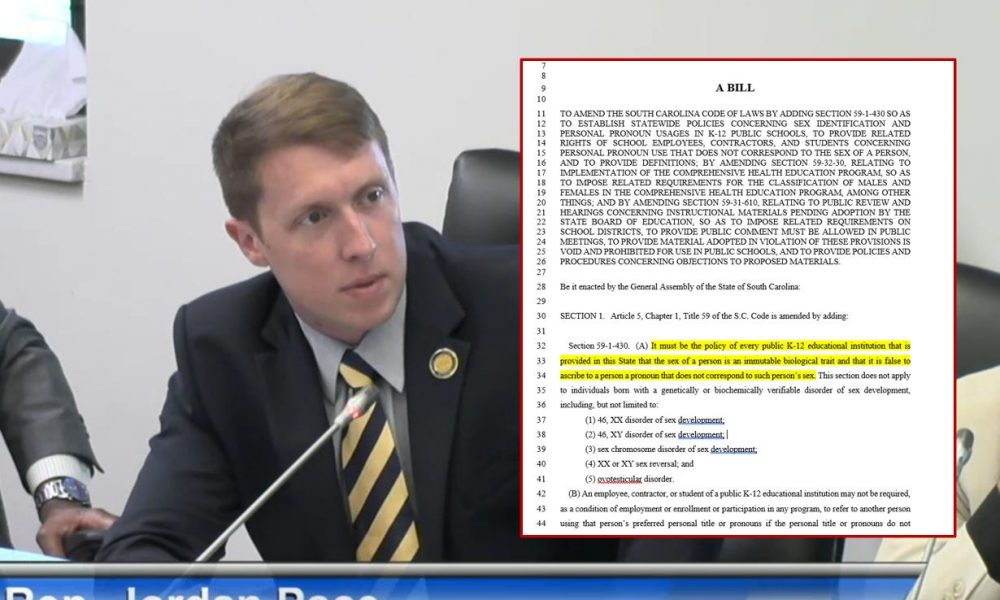
COLUMBIA – South Carolina’s Republican Governor Henry McMaster signed H.4608, the “Save Women’s Sports Act,” an anti-transgender bill that restricts trans students from participating in school sports that matches their gender identity in middle school, high school, and colleges across the state. All students will only be allowed to compete with the gender listed on their birth certificate.
The measure had passed its final legislative hurdle earlier this month and was forwarded to McMaster who signed it on Monday.
The passage of H.4608 comes after more than two years of LGBTQ+ and allied South Carolinians resisting similar efforts to ban transgender youth from sports participation. Between 2020 and 2021 advocates defeated 8 different versions of this bill, demonstrating consistent and powerful leadership from supporters of transgender dignity and equality. SC United for Justice & Equality is a coalition of more than 30 organizations committed to LGBTQ equality in SC that fought hard against the bill.
“It pains us to see lawmakers in South Carolina, and now the governor, ignore the voices of thousands of South Carolinians – including parents, medical providers, students, faith leaders, and transgender people ourselves – who expressed loudly and clearly that this bill will harm young people in our state. Transgender youth are not a threat to fairness in sports, and this law now needlessly stigmatizes young people who are simply trying to navigate their adolescence, make friends, and build skills like teamwork and leadership, winning and losing,” Ivy Hill, a leader in the coalition who serves as Executive Director of Gender Benders and Community Health Program Director of Campaign for Southern Equality, said in a statement.
“While extreme lawmakers ultimately forced through this anti-transgender attack, the SC United for Justice & Equality coalition is so proud of the ways that thousands of supporters of transgender dignity spoke out and organized against H.4608 and other bills this year. We are grateful for every South Carolinian who expressed their love, support, and respect for transgender youth and rejected these politics of division and cruelty. Despite this setback, we will never stop fighting on behalf of trans and queer young people, and our coalition will explore every strategy possible to surmount every barrier to equality,” Hill added.
Dr. Elizabeth Mack, a board certified pediatric critical care physician and pediatrician in Charleston, SC, has been one of many medical providers who has worked against the bill. When the bill passed in the Senate, she said:
“As a born and raised South Carolinian, it is my expectation that our state’s elected officials make decisions based on evidence and listen to our state’s experts. We must not play into fear or treat some of our most vulnerable community members – our transgender young people – like political pawns. Transgender youth face higher rates of bullying, mental health issues, and even suicide than their non-transgender peers, which we sadly see routinely in pediatric ICUs. This bill tells a population that is already at risk, ‘We do not support you,’ and I am devastated to see it pass. We must protect our future – our young people.”
A 2019 report from the Campaign for Southern Equality found that more than half of LGBTQ+ people in SC reported experiencing depression (71%) and anxiety (63%) – and rates were even higher for trans individuals and those who are BIPOC.
“Every day, The Trevor Project’s crisis counselors hear from young transgender and nonbinary people who want nothing more than to be honest about who they are and have the same opportunities as their peers. Like every one of the sports bans we’ve seen passed across the country over the last three years, this is a solution in search of a problem, and it will only work to increase the isolation and stigmatization of an already-marginalized group of students,” said Sam Ames, Director for Advocacy and Government Affairs at The Trevor Project. “Our 2022 national survey finds that nearly 1 in 5 trans and nonbinary youth attempted suicide in the past year — and this elevated risk is not due to their gender identity, but rather because of how they are mistreated. It’s heartbreaking to know that trans youth, who already report the highest rates of anxiety and depression symptoms, now have one more thing to worry about. We implore lawmakers to stop these unfair and unnecessary policies targeting a small group of marginalized youth, and focus their energy on the well-being of all youth.”
The Trevor Project’s new national survey also found that 71% of transgender and nonbinary youth reported that they have experienced discrimination based on their gender identity, and those who have reported significantly higher rates of attempting suicide in the past year compared to those who have not. However, research also shows that transgender and nonbinary youth who had access to gender-affirming schools report lower rates of attempting suicide.
Recent polling conducted by Morning Consult on behalf of The Trevor Project, 85% of transgender and nonbinary youth say recent debates about state laws restricting the rights of transgender people have negatively impacted their mental health. When asked about new policies that would ban transgender girls from playing on girls’ sports teams and transgender boys from playing on boys’ sports teams, 74% of transgender and nonbinary youth said it made them feel angry, 57% felt sad, 43% felt stressed, and nearly 1 in 3 felt scared.
A 2021 peer-reviewed study by The Trevor Project’s researchers, published in Transgender Health, also found that transgender and nonbinary youth who reported gender identity acceptance from adults and peers had significantly lower odds of attempting suicide in the past year. The Trevor Project’s research has also found that a majority of LGBTQ young people (68%) have never participated in sports for a school or community league or club — with many citing fear of bullying and discrimination as a key factor for not participating.



